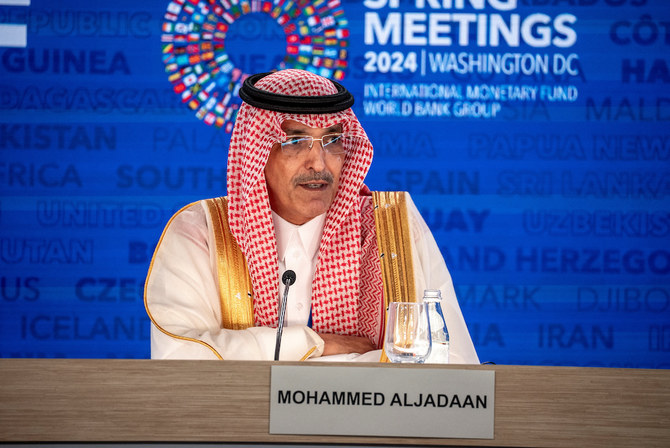RIYADH: The International Monetary and Financial Committee on Friday held its biannual meeting in Washington DC to discuss the global macroeconomic and financial impact of current conflicts.
The IMFC members focused on the war in Ukraine, the humanitarian crisis in Gaza, and shipping disruptions in the Red Sea, said Mohammed Al-Jadaan, the Saudi minister of finance and the body’s chair.
Al-Jadaan said IMFC members acknowledged that the crises had significant impacts on the global economy, but added that the body was not the forum to resolve geopolitical and security issues, and that they should be discussed in other forums.
He said: “The IMFC’s role is to advise and report on the supervision and management of the international monetary and financial system. This includes responses to events that may disrupt the system.
“Of course, the world and the IMF (International Monetary Fund) itself have faced multiple global disruptions over the last few years. Prospects are improving, which is very positive, but numerous challenges remain, and we need to be vigilant and ready to address them. Today’s era must not be of war and conflict.”
The Saudi minister chairs the IMFC, the policy advisory body to the IMF’s board of governors, and was speaking during the committee’s gathering at the Spring Meetings of the IMF and World Bank.
The IMFC thanked outgoing chair Nadia Calvino for her leadership and welcomed Al-Jadaan as her replacement.
Al-Jadaan said: “A soft landing for the global economy appears to be drawing closer.
“Economic activity has proved more resilient than expected in many parts of the world, though it continues to diverge across countries.”
But as ongoing conflicts continue to burden the global economy, this has led to some weak growth prospects in the medium term.
Al-Jadaan said: “Even though inflation has fallen in most regions, owing to the unwinding of supply shocks and the effects of tight monetary policy, its persistence warrants caution.
“While risks to the outlook are now broadly balanced, downside risks remain, hinging on the near-term paths for inflation and interest rates, asset prices and financial stability, fiscal policy actions, as well as geopolitical developments.”
Other pressing challenges were also affecting the global economy, such as climate change, elevated debt vulnerabilities, rising inequality, and the risk of geoeconomic fragmentation, he added.
The Saudi minister said: “Against this background, our policy priorities are to achieve price stability, strengthen fiscal sustainability, and safeguard financial stability, while promoting inclusive and sustainable growth.
“We will proceed with rebuilding fiscal buffers, carefully tailoring actions to country-specific circumstances, while protecting the most vulnerable and growth-enhancing investment.”
Al-Jadaan said central banks remained strongly committed to achieving price stability and would continue to communicate policy objectives to help limit negative spillovers.
He added: “We continue working to address data, supervisory, and regulatory gaps in the financial sector, especially nonbank financial institutions, where relevant, and stand ready to deploy macroprudential policy tools to mitigate systemic risks.”
He said the IMF stresses the importance of international cooperation to improve the resilience of the global economy and the international monetary system, adding that members will “act collectively, as appropriate, to support climate and digital transitions, including artificial intelligence, while accounting for country-specific circumstances.”
During the meeting, which was held in the presence of the IMF’s Managing Director Kristalina Georgieva, Al-Jadaan reiterated the IMF’s commitments on exchange rates, addressing excessive global imbalances, governance, and avoiding protectionist measures.
He said: “We will also continue working together to strengthen the global financial safety net, address global debt vulnerabilities (and support) vulnerable countries as they undertake reforms to tackle their vulnerabilities and address their financing needs.”
Al-Jadaan also said the IMF would continue its “critical and catalytic role in providing financial assistance to help members address their balance of payments problems and achieve economic stability and inclusive growth.”
He added that the body was looking to welcome a new 25th chair on the IMF’s Executive Board for Sub-Saharan Africa in November to improve representation and the overall balance of regional representation.
He said: “We support the IMF’s strengthened efforts to attract and develop talent to support existing and new priority areas, and to further improve staff diversity and inclusion, responding to the specific challenges identified in the FY2022-FY2023 Diversity and Inclusion Report.”
He also announced that the next IMFC 24 members’ meeting was expected to be held in October. Representatives usually meet twice a year, at the Bank-Fund Annual and Spring Meetings, to outline the proposed agenda for the IMF’s work program.




























